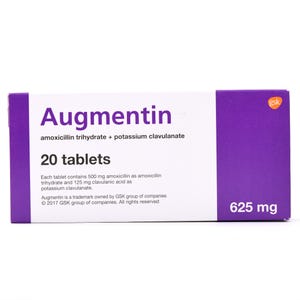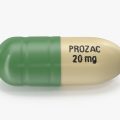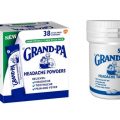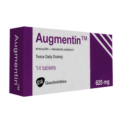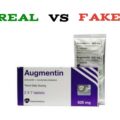Augmentin is a prescription antibiotic medication. It’s used to treat infections caused by bacteria. Augmentin belongs to the penicillin class of antibiotics. Augmentin contains two drugs: amoxicillin and clavulanic acid. This combination makes Augmentin work against more types of bacteria than antibiotics that contain amoxicillin alone. Augmentin is effective for treating infections caused by many different types of bacteria. These include bacteria that cause: Pneumonia, ear infections, sinus infections, skin infections, and urinary tract infections.
Augmentin comes in three forms, all of which are taken by mouth. It is available in a generic form. The generic name of Augmentin is amoxicillin/clavulanate potassium. In some cases, the brand-name drug and the generic version may be available in different forms and strengths. The generic version of this drug is available in the same forms as Augmentin, as well as in a chewable tablet.
Side Effects of Augmentin
Augmentin can cause mild or serious side effects. The following list contains some of the key side effects that may occur while taking Augmentin. This list does not include all possible side effects. For more information on the possible side effects of Augmentin, or for tips on how to deal with a troubling side effect, talk with your doctor or pharmacist.
More common side effects
The more common side effects of Augmentin include:
- diarrhea
- nausea
- skin rash
- vaginitis (caused by problems such as yeast infection)
- vomiting
These side effects may go away within a few days or a couple of weeks. If they’re more severe or don’t go away, talk to your doctor or pharmacist.
How To Deal With Augmentin Side Effects
Nausea is a queasy feeling in your stomach — you may feel seasick, or you may feel you’re about to vomit. Medications that commonly cause nausea as a side effect include antibiotics, such as Augmentin.
To combat nausea and vomiting from Augmentin, follow these steps:
- Talk to your doctor about dosage timing. Discuss the severity and frequency of your nausea with your doctor. He may be able to alter the timing and dosages of your medications to reduce the unpleasant feeling or prescribe a nausea medication to help.
- Take to your doctor about anti-nausea medication. If your doctor has prescribed an anti-nausea medication, take it as soon as you begin to feel nauseated.
- Spread your day’s food. Instead of three large meals per day, spread your day’s food over five smaller meals. Choose easy-to-digest foods and stop eating before you feel full; overeating can increase nausea. Before taking your medication, try nibbling on a few saltines or toast. Avoid sugary snacks and drinks.
- Monitor your drinks. Avoid drinking too much liquid with your meals, and drink slowly between meals to prevent triggering nausea. Take small sips of lemon water or suck on ice chips to reduce nausea.
- Rest. Let your stomach settle after meals. Avoid vigorous activity for 30 minutes or so, but do not lie down right after eating. Read a book or magazine to keep your mind occupied. When feeling nauseous at other times, place a cold cloth on your forehead and lie down in a dark room.
To cope with diarrhea:
- Drink enough fluids. To counter a mild loss of fluids from diarrhea, drink more water. For a more-severe loss, drink fluids that contain water, sugar, and salt. Try broth or fruit juice that isn’t high in sugar. Avoid beverages that are high in sugar or contain alcohol or caffeine, such as coffee, tea, and colas, which can worsen your symptoms. For infants and children with diarrhea, ask your doctor about using an oral rehydration solution, such as Pedialyte, to replenish fluids and electrolytes.
- Avoid certain foods. It’s a good idea to avoid fatty and spicy foods while you have diarrhea. You can usually get back to a normal diet soon after your symptoms resolve.
- Ask about anti-diarrheal medications. In some cases of mild antibiotic-associated diarrhea, your doctor may recommend anti-diarrheal medications, such as loperamide (Imodium A-D). But check with your doctor before taking anti-diarrheal medications because they can interfere with your body’s ability to eliminate toxins and lead to serious complications.
To cope with headaches
People can try many of these remedies right away, and some of them might help to prevent headaches in the future
- Drinking enough water. Water may help prevent headaches or reduce their severity. Dehydration can be an underlying cause of many simple headaches. It may also alter how a person feels, acts, or thinks. As a study in the journal Antioxidants notes, even slight dehydration may alter how people think and function, making them feel worse, with or without a headache.
- A cold compress. A cold compress may be a simple headache solution that many people have on hand. Applying an ice pack or another cold item to the head or neck may help constrict the blood vessels and reduce inflammation in the area. Doing so could temporarily relieve headache pain.
- Warm compress. In other cases, such as with a tension headache where the muscles are too tight, a warm compress may help relax these muscles and bring relief. A warm compress could be as simple as a heated towel. People may be able to get the same effect from a tepid shower or bath.
- Turn off lights. Some people who get headaches become sensitive to light. Bright office lights or even the bright light from a smartphone may make symptoms worse. It may help to rest in a dark or dimly lit room while recovering from a headache. Some people who take Augmentin may become more sensitive to sunlight than they are normally. Exposure to sunlight, even for brief periods of time, may cause severe sunburn, skin rash, redness, itching, or discoloration.
- Abstain from Alcohol. Antibiotics and alcohol can cause similar side effects, which are compounded when you take them together. Some medications can trigger more severe reactions when taken with alcohol, including:
- Flushing
- Headaches
- Nausea and vomiting
- Increased heart rate.

